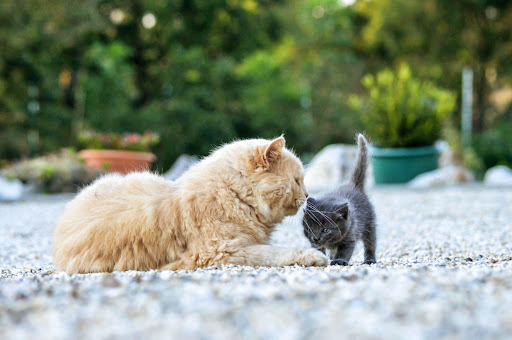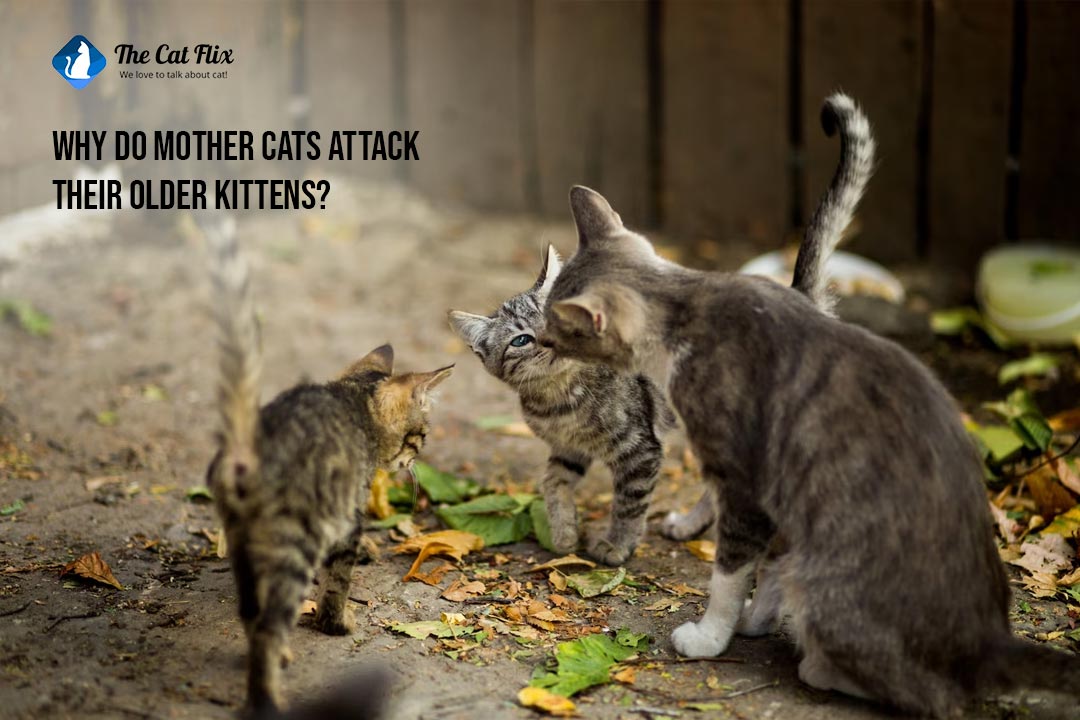Ever wondered why mother cats sometimes act mean to their older kittens? It’s a bit of a head-scratcher, isn’t it? But don’t worry; we’re here to unravel this mystery.
“Why Do Mother Cats Attack Their Older Kittens?”—a question that might have crossed your mind if you’re a cat lover, or encountered this scenario.
Well, if kittens are all grown up, mother cats want them to find their own way to live and territory. Sometimes it can happen due to lack of resources or postpartum changes.
Understanding the reasons behind their aggressive behavior can help you find the solution, make their lives better and create a more peaceful home.
In the pages ahead, you’ll learn about why mother cats sometimes attack their older kittens, and by the end, how to make your bond with them even stronger.
Why Are Mother Cats Attacking Her Older Kittens?
Whether we’re cat parents or simply admirers of these enigmatic creatures, one thing’s for sure: cats are truly fascinating.
Some of them are quite dramatic, some of them are too obsessed with their owner. Some are calm and gentle, while others are as wild as a storm, like our orange cat, remember?
Along with their versatile characteristics, they become more unpredictable, especially when they’re expecting or have just become new mothers. One behavior that often makes us worrisome is when mother cats seem to be attacking their older kittens.
Kittens are Grown Enough
When kittens start to grow up, they become more self-dependent and curious. They begin to explore their surroundings, sometimes wandering away from their nest.
Whilst a mother cat senses that her kittens are becoming self-enough, she may also start to distance herself from them.
If the kittens are still quite young, the mother usually keeps them close. However, as she believes they’re ready to fend for themselves, she might gently nudge them away.
This is a common behavior among cats when their offspring reach around 14 weeks of age.

Asserting Dominance
At some points, older kittens may start to encroach on their mom’s region or territory, which can make cat moms feel threatened. While she attacks her babies, it’s a sign that they need to set up their own territorial area or litter box and learn how to be self-reliant.
By asserting her authority, she’s teaching her offspring to follow her lead, learn essential skills to survive, and respect others’ boundaries and dominance. While it may seem harsh to us, it’s a fundamental aspect of feline social dynamics.
Competition for Resources
Lack of food and space can lead cat mothers to attack their adult baby. As kittens grow up, they become more active and demand more food, attention, and space.
This increased demand can lead to competition among the siblings, and the momma cat may show aggression to maintain control over access to vital resources.
Some of you may be wondering whether you should let your cat have free reign of your house. Well, find it yourself by clicking the link!
Lack Of Socialization
Mother cats may sometimes attack older kittens because they didn’t develop the socialization skills properly. In the first two weeks of life, kittens rely on their mother’s care for food and warmth.
The mother’s grooming is crucial for their socialization skills. If she doesn’t have enough time for this early care, the kittens might miss out on proper socialization, making them more likely to be attacked by their mother later.
Natural Weaning Process
Mother cats typically start weaning their kittens at around three to four weeks of age. During this period, they may become less tolerant of nursing, and their aggression can serve as a signal to the kittens that it’s time to transition to solid food.
In some cases, after delivery mom cats become unable to feed her babies. At that moment as a cat parent you have to take responsibility.
Read this article to learn what to feed kittens when mom won’t.
Postpartum Hormonal Changes
After giving birth, a mother cat experiences hormonal fluctuations that can affect her temperament. She may become more protective and territorial, which can sometimes be mistaken for being aggressive towards her older kittens.
Estrus (Heat) Cycles
Mother cats can go into heat shortly after giving birth, and during this time, they may become more irritable and less tolerant of their kittens. This temporary change in behavior can lead them to onslaught their adult babies.
Signs Of Maternal Aggression in Mother Cat
To effectively manage maternal aggression, it’s crucial to recognize the signs early on. Here are some common indicators:
- Hissing and Growling: Mother cats may hiss and growl at their older kittens, warning them to keep their distance.
- Swatting: Light swatting with their paws is another common behavior, intended to discourage the kittens from unwanted behavior.
- Biting: In some cases, mother cats may resort to biting and kicking kittens, though it is usually not severe.
How Long Does Maternal Aggression Last in Mother Cats?
Mother cats, or ‘Queens’, can be very protective of their kittens. They may act aggressively towards anyone who tries to touch them. This usually lasts for a few weeks until the kittens can take care of themselves.
But some mother cats may be more or less aggressive up to six weeks in the weaning process. It all depends on your cat!

Can Spaying The Mother Cat Prevent Maternal Aggression?
Well, the short answer is yes! Spaying the mother cat can indeed prevent maternal aggression. When a cat is spayed, her maternal instincts can mellow out, and she’s less likely to get overprotective and aggressive towards her kittens.
It’s like hitting the chill button for your feline family. So, if you want a more relaxed and less aggressive momma cat, spaying is a good option to consider.
But one thing to remember is it may not eliminate it entirely. Consult with a vet for advice on spaying.
What Factors Can Trigger Maternal Aggression?
When a mom cat gets all feisty, she not only attacks her older kittens, but also shows aggression towards other cats. Let’s see what factors trigger her to transform into a ferocious defender.
- Maternal Stress: Stress can affect any living being, including mother cats. When she experiences high levels of stress, whether due to changes in her environment or overwhelming situations, it can trigger maternal aggression.
Mom cats may become more defensive and protective, leading to aggressive behavior towards her adult kittens.
- Illness Or Injury: If a mom cat is sick or in ache because of an injury or health issues, her pain can make her more irritable and prone to attack. In such cases, she can also lash out at her kittens, specifically older ones, or onslaught other cats or pets.
- External Disturbances: External disturbances such as loud noises, unfamiliar scents, or the presence of other animals can put a mother cat on edge, making them react aggressively.
How Do I Stop My Cat From Attacking Her Kittens?
If you find that your mother cat’s aggression towards her older kittens is becoming problematic, there are steps you can take to prevent her from attacking grown kittens.
- Separate the Aggressor
If the mother cat is excessively aggressive, consider temporarily separating her from the kittens to prevent harm. This can also give her a break and reduce her stress.
Many of you have a common question: how long should kittens stay with their mom, or when can kittens leave their mom? Well, kittens should ideally stay with their mother for at least 8 to 12 weeks to ensure they receive proper nutrition, socialization, and maternal care. Some experts suggest it’s better to stay with their mom for 12-14 weeks.

- Provide Adequate Resources
Ensure the mother cat and her kitten (small, or older) has ample resources like food, water, and a comfortable resting place. Enough resources are equal to content mom cat and happy kittens.
- Create Stress-Free Surrounding
Keep the environment calm and free from disruptions. Avoid loud noises and limit the presence of strangers or other pets that might stress the mother cat.
- Gradual Reintroduction
Once you notice a decrease in aggression, reintroduce the mother cat to her older kittens gradually. Supervise their interactions closely to ensure they can coexist peacefully.
- Slow Transition From Nursing
If the aggression is related to weaning, slowly transition the kittens to solid food, allowing the mother to adjust at her own pace. This can help reduce her anxiety.
When Should I be Concerned About Mother Cats Attacking Her Older Kittens
If you’re wondering whether it’s normal for mother cats to be occasionally aggressive towards their kittens, then yes, it’s completely fine.
Because this can happen when the mother cat is irritable due to health issues or if she’s expecting another set of kittens and needs space.
During this time, she may unintentionally attack her kittens while trying to keep them away from her. It’s a natural part of motherhood for cats. But there are situations when you should be concerned:
- Excessive Aggression: If the mother cat’s aggression becomes overly intense and frequent, causing harm to the kittens, it’s a cause for concern.
- Persistent Aggression: If the mother continues to attack her older kittens even after they reach an age where they should be more independent, it’s a sign of a potentially serious issue.
- Kittens’ Well-Being: When you notice that the kittens’ health or emotional well-being is deteriorating due to the mother’s aggression, it’s time to take action.
When to Seek Professionals Help
If you observe any of the concerning signs mentioned above, it’s essential to seek professional help. You can consult a Veterinarian. He/she can assess the health of both the mother cat and her kittens to rule out any underlying medical issues contributing to her aggression.
Also, consider reaching out to an animal behaviorist or a professional cat trainer who specializes in feline behavior. They can provide guidance on how to address and manage the aggression effectively.
If the safety of the kittens is at risk due to the mother’s aggression, it’s crucial to separate them and seek immediate professional assistance to ensure their well-being.
Ending
Understanding why mother cats sometimes attack their older kittens is essential for cat owners. By recognizing the natural instincts and behaviors at play, you can take steps to create a safe and harmonious environment for both the mother cat and her kittens.
Remember that patience, gradual weaning, and seeking professional advice when needed are key to managing this situation effectively.

